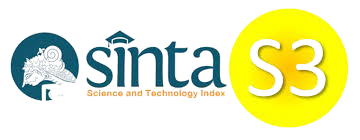SPIRITUALITY ANALYSIS AND ORGANIZATIONAL COMMITMENTS IN MURABAHAH WITH INDIVIDUAL ACCURACY AS MEDIATION VARIABLE
DOI:
https://doi.org/10.21512/jafa.v8i2.8206Keywords:
Murabaha, Financing, Spirituality, Individual, AccuracyAbstract
The objective of this study is to analyze the spirituality of work and organizational commitment especially in murabahah financing. This study based on primary data and with explanatory format. This research environment for this study is real in the Islamic banking entitites in Jakarta. The sample of this research is financing staff in Islamic banking in Jakarta and the questioner was distributed to them. The result of this study is spirituality will influence the decision making process of murabaha financing in the Islamic financial entities in Jakarta with the mediation variable is individual accuracy mediates the relationship between murabaha financing approval processes and commitment to organizational goals.
References
Adawiyah, Wiwiek Rabiatul dan Bambang Agus Pramuka, “ Scaling The Notion Of Islamic Spirituality In The Workplace”, Journal Of Management Development, Vol 36, No 7, 2017
Afsar, Bilal & Yuosre Badir, “ Workplace Spirituality, Perceived Organizational Support & Innovative Work Behaviour : The Mediating Effect Of Person-Organization Fit “, Journal Of Workplace Learning, Vol 29 No 2, 2017
Allen, Natalie J & John P Meyer,”A Three Component Conceptualization Of Organizational Committment”, Human Resource Management Review, 1991
Amin, Hanudin, Abdul Rahim Abdul Rahman, Stephen Laison Sondoh Jr & Ang Magdalene
Choi Hwa, “ Determinants Of Customer Use To Islamic Personal Financing The Case Of Malaysian Islamic Bank”, Journal Of Islamc Accounting and Research, Vol 2 no 1, 2011
Ashmos,D.P & Duchon, D,” Spirituality At Work, A Conceptualization and Measure”,Journal Of Management Inquiry, Vol 19 No 2, 2000
Augustine, Yvonne & Robert Kristaung” Metodologi Penelitian Bisnis Dan Akuntansi “ Penerbit Dian Rakyat, Jakarta, 2013
Batson, C.D & Ventis,W.L, “ The Religious Experience: A Social Psychological Perspective
Becker, Howard S,” Notes On The Concept Of Commitment”, The American Journal Of Sociology, Vol 66 No 1, 1960
Cavanagh, Gerald F,”Spirituality For Managers: Context and Critique”, Journal Of Organizational Change and Management, Vol 12 no 3, 1999
Collom, Ed, “ The Motivation, Engagement, Satisfaction, Outcome, and Demographic Of Time Bank Participant: Survey Finding From US System , International Journal Of Community Currency Research, Vol 11 pp 36-83
Compton, W.C,” Introduction To Positif Pscychology”, Singapore, 2005
Cooper, Donald L & Pamela S Schndler, “Business Research Methods 12th Edition, Mcgraw-Hill/Irwin , New York USA, 2014
Dandona, Anu,” Spirituality at Workplace and Job Satisfaction”, International Journal Of Bioscinces, Alternative and Holistic Medicine ”, Volume 4 No 1, 2013
Djafri, Fares & Kamaruzaman Nordin,”The Impact Of Workplace Spirituality On Organizational Commitmen : A case study of Takaful agents in Malaysia”, Humanomics, Vol 33, Issue 3, 2017
Dasti, Rabia & Aisha Sitwat, “ Development of a Multidimentional Measure Of Islamic Spirituality”, Journal Of Muslim Mental Health, 2014
Esposito, John L, “Re-Thingking Islam and Secularism”, Guiding paper series, Association Of Religion Data Archives
Fernando, Mario & B.Jackson,”The Influence Of Religion Based Workplace Spirituality On Business Leader Decision Making: an Interfaith study”, Online papers University Of Wollongong, Faculty Of Commerce, 2006
Gottheill, Elisa Antonieta, “ A Grounded Theory Study Of Spirituality Using Personal Narratives Suggested By Spiritual Images”, Dissertation Submitted to Pacifica Graduate Institute, 2006
Grine, Fadila; Djafri Fares & Anchour Meguiellati,”Islamic Spirituality and Entrepreneurhip: A Case Study Of Women Entrepreneurs in Malaysia”, The Journal Of Happiness & Well Being, Volume 3 No 1, 2015
Huda, Nurul & Mohamad Heykal,” Lembaga Keuangan Islam : Tinjauan Teoritis dan Praktis”, Penerbit Kencana Prenada Media, Jakarta, 2010
Kamayanti, Ari, “ Metodologi Konstruktif Riset Akuntansi Membumikan Religiositas, Yayasan Rumah Peneleh, 2016
Kanagaretnam Kiridaran, Gerald J Lobo dan Chong Yang,”Religiosity & Earnings Managenent, International Evidence From The Banking Industry”, 2013
Karakas, Fahri, “ Spirituality and Performance In Organization: a Literature Review”, Journal Of Business Ethics, 2010
King, Michael,et al,” Measuring Spiritual Belief: Development and Standardization Of A Beliefs and Value Scale”, Psychological Medicine, 2006
Konz,G.N.P & Ryan, F.X,” Maintaning an Organizational Spirituality : No Easy Task”, Journal Of Organizational Change Management, Vol 12 No 3, 1999
Long, Brad s & Cathy Driscoll,” A Discursive Texttscape Of Workplace Spirituality”, Journal Of Organizational Change Management, 2015
Maski, Ghozali, “ Analisa Keputusan Nasabah Menabung: Pendekatan Komponen Dan Model Logistik Studi Pada Bank Syariah Di Malang “, Journal Of IndonesianApplied Economics, Vol 4 No 1, mei 2010, pp 43-57
Milliman,J et al,” Workplace Spirituality and Employee Work Attitude, an Exploratory Empirical Assesment”,Journal Of Organizational Change Management, Vol 16 No 4, 2003
Mitrof, LL & Elizabeth A Denton & Can Murat Alpaslan, ” A Spiritual Audit Of Corporate America,Ten Years later ( Spiritually and attachment theory: An Interim Report ) “, Journal Of Management, Spirituality and Religion, 2009
Mowday, R.T., Porter, L.W., & Steers, R.M. (1982). Employee-organization linkages: The psychology of commitment, absenteeism, and turnover. New York: Academic Press.
Pargament,K.I,Smith, B.W,Koenig, H.G & Perez,L,”Patterns Of Positive and Negative Religious Coping with major Life Stressors”, Journal for The Scientific Study Of Religion,2006
Pamungkas, Imam Dapit,”Pengaruh Religiusitas & Rasionalisasi Dalam Mencegah &
Mendeteksi Kecenderungan Kecurangan Akuntansi”,Jurnal Ekonomi dan Bisnis Volume 15, nomor 2.September 2014
Pramuka, Bambang Agus, “ Accounting In Indonesia: A Study Of Ideological Western and Islamic Accounting Thought and Practices “, Disstertation Submitted To PhD, University Of Hull, UK, 1998
Petchsawanga, Pawineee & Dennis Duchon,” Workplace Spirituality, meditation and work performance “, Journal Of Management, Spirituality and Religion, Vol 9 No 2, 2012
Rahman, Abdul Rahim Abdul” Contribution Of The Islamic Principle Of Maaliah”, IIUM Journal Of Economics and Management
Raiya, Hisham Abu, “ A PSYCHOLOGICAL MEASURE OF ISLAMIC RELIGIOUSNESS: EVIDENCE FOR RELEVANCE, RELIABILITY AND VALIDITY”,Disssertation Submitted to Graduate College Bowling Green, “ 2008
Rashed,Nayal.,Gholamreza Zandi & Mohammed Sulaiman,”Spirituality and Leaders Effectiveness: An Islamic Perspective”, Asian Economic and Financial Review, Vol 5, No 1, 2015
Rulindo, Ronald & Amy Mardhatillah, “ Spirituality, Religiosity and Economic Performance Of Muslim Entrepreneur”, paper presented at 8th International Conference On Islamic Economics and Finance, 2008
Shafranske, E.P,”Introduction: Foundation For Consideration of Religion in The Clinical Practice Of Psychology”, Washington DC: American Psychological Association,1996
Sekaran, Uma, “ Research Methods For Business-A Skill Building Approach, Wiley
Downloads
Published
Issue
Section
License
Authors who publish with this journal agree to the following terms:
Authors retain copyright and grant the journal right of first publication with the work simultaneously licensed under a Creative Commons Attribution License that allows others to share the work with an acknowledgement of the work's authorship and initial publication in this journal.
Authors are able to enter into separate, additional contractual arrangements for the non-exclusive distribution of the journal's published version of the work (e.g., post it to an institutional repository or publish it in a book), with an acknowledgement of its initial publication in this journal.
Authors are permitted and encouraged to post their work online (e.g., in institutional repositories or on their website) prior to and during the submission process, as it can lead to productive exchanges, as well as earlier and greater citation of published work (See The Effect of Open Access).





